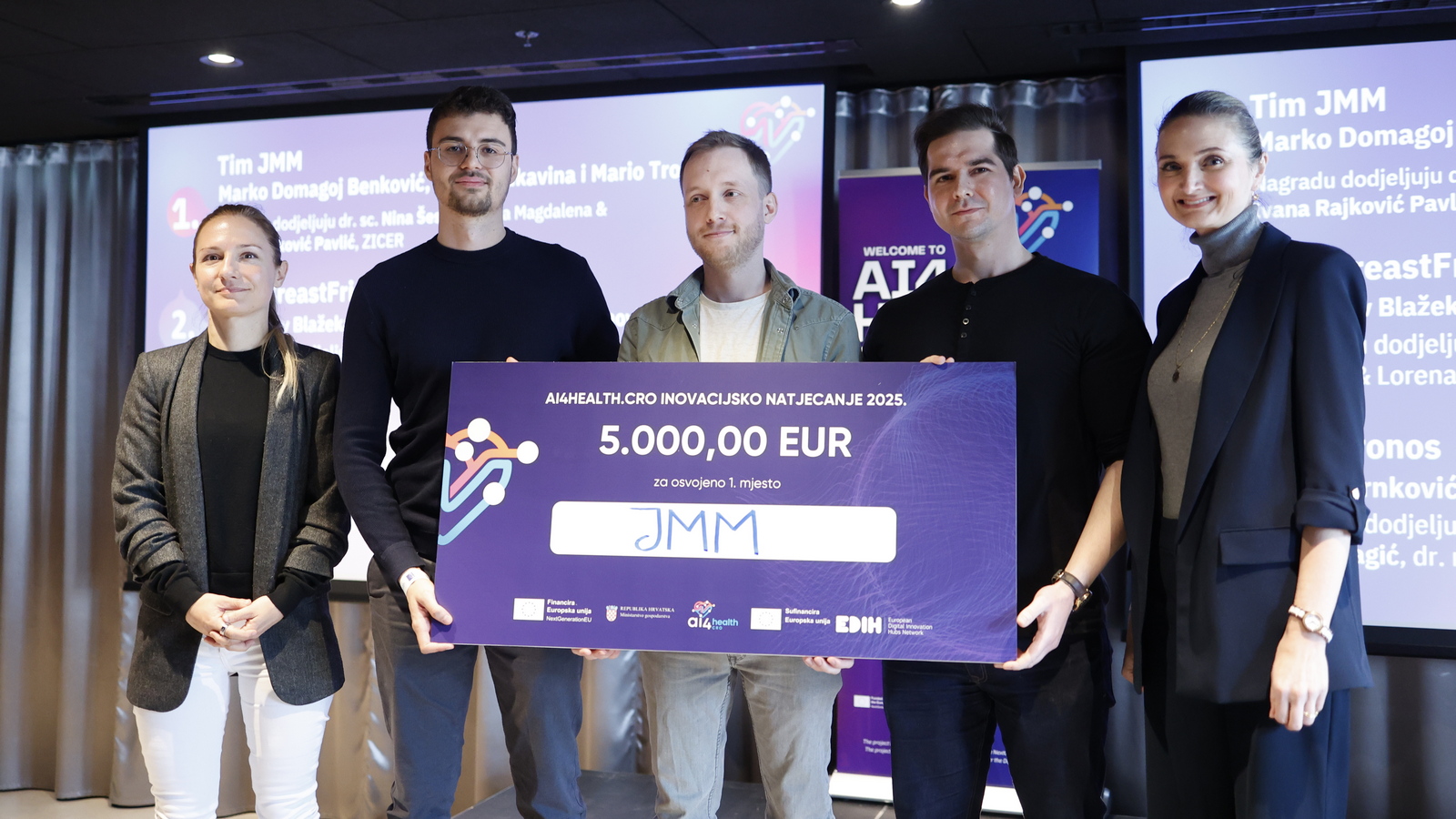The final event of the innovation challenge took place today during the annual conference of the European Digital Innovation Hub for AI in Healthcare and Medicine (EDIH AI4Health.Cro). Awards were presented to the three top-ranking teams. The conference was opened by Andrea Čović Vidović, Deputy Head of the European Commission Representation in Croatia, Hrvoje Belani, Head of the Sector for Implementation and Improvement of Information Systems at the Ministry of Health; and Dr. David M. Smith, Director of the Ruđer Bošković Institute.
Following the opening remarks, the three top teams presented their innovative solutions to a packed audience of over a hundred experts from the health tech, clinical, and start-up communities.
Team JMM claimed first prize and €5,000 with their AI-powered diagnostic tool. Team BreastFriends took second place and €3,000, while Team Kronos won third place and a €1,000 prize.
Tackling Breast Cancer with Smarter Tools
Breast cancer still claims over 670,000 lives every year, and early detection is crucial. While mammograms help save lives, doctors are often overwhelmed by the sheer volume of images and data they need to process. That’s where Team JMM’s idea comes in—an AI-powered tool that acts like a digital assistant for radiologists.
This year’s challenge drew 106 participants and 34 teams, with 13 advancing to the final development phase.
Participants tackled four major AI-related challenges in mammogram analysis. First, they had to train an AI model capable of identifying and classifying breast lesions according to the BI-RADS system – a key standard for assessing breast cancer risk. Then, they had to develop tools that pinpoint suspicious areas on scans, mimicking the insight of seasoned radiologists. The third task required teams to explain how their models reached conclusions – a vital step toward uncovering patterns and identifying biases. Finally, they had to design an intuitive and informative user interface that helps doctors interpret results, complete with transparent diagnostic explanations and confidence ratings.
“Teams weren’t just building AI applications - they were creating full-fledged business concepts. We saw impressive creativity and a wide range of approaches,” said Dr. Anja Barešić, AI4Health.Cro project coordinator from the Ruđer Bošković Institute. “We truly hope that at least one promising start-up emerges from this competition, focused on solving real challenges in Croatian healthcare. Judging wasn’t easy, but we had the help of top experts from our consortium,” she added.
Unique Synergy of Skills
Team JMM attributed their success to the unique mix of skills and expertise each member brought to the table, which allowed them to quickly exchange ideas and make progress.
The team members are all alumni of the University of Zagreb, with backgrounds from the Faculty of Electrical Engineering and Computing (FER) and the Faculty of Science. Jakov Rukavina is a computer vision specialist, developing advanced algorithms for image analysis. Mario Tropčić, a PhD student at FER, focuses on deep learning algorithms that enable precise pattern recognition in medical imaging. Marko Domagoj Benković, a machine learning expert from the Faculty of Transport and Traffic Sciences, contributed with insights into the latest AI trends and innovations.
“We presented our solution through an interactive interface that allows doctors to process and analyze mammogram images in real time, including the ability to compare new scans with past ones,” explained team lead Marko Domagoj Benković. “Using advanced machine learning models, the app automatically assigns BI-RADS scores to identify potentially cancerous lesions and highlights anomalies in the images. It also includes visual tools that support the diagnostic process and generates reports that can be saved as PDFs.”
Looking ahead, the team says the future of the project will depend on several factors, including potential investments and personal obligations. “Ideally, we’d like to improve the model’s accuracy and add more functionalities to the interface,” added Marko, Jakov, and Mario.
The Bigger Picture: AI4Health.Cro in Action
Dr. Barešić also pointed out that AI4Health.Cro does more than run innovation challenges—it supports companies as they go through digital transformation, thanks to its strong network of 16 sector partners. “As we wrap up the second year of the project, we’re proud to have supported 37 organizations through tailored digital transformation programs, which included training, networking, funding, and testing,” she said.
Tech Transfer and Real-World Impact
Frane Šesnić, Director of ZICER, shared his excitement about the results: “Huge congrats to all the finalists—especially the winners. They’ve created life-saving solutions in record time. We believe in turning science into business, and programs like ours help researchers bring their work to the real world, solve actual problems, and maybe even start a company.”
ZICER’s Tech Transfer accelerator program is opening up again soon, giving scientists the chance to work with mentors, build prototypes, and connect with industry leaders.
Learning from the Best
The conference also featured a line-up of inspiring speakers. One highlight was Dr. Hemmel Amrania, founder of Digistain, whose pioneering technology has upgraded breast cancer diagnostics by more accurately identifying which patients need chemotherapy, reducing wait times and healthcare costs. His research at Imperial College London earned him numerous awards and investment from major global players including Y Combinator (from over 17,000 applicants) and Harvard Capital.
Another highlight came from Kaloyan Ratchev, founder of Vangavis and the Onco-Innovate initiative. He gave attendees a deep dive into the challenges and opportunities for AI start-ups in Europe and stressed the importance of interdisciplinary innovation. As a long-time leader of the AI ecosystem through the European AI Forum and Bulgaria’s AI Cluster, Ratchev offered valuable insights into shaping the future of health-tech innovation.




